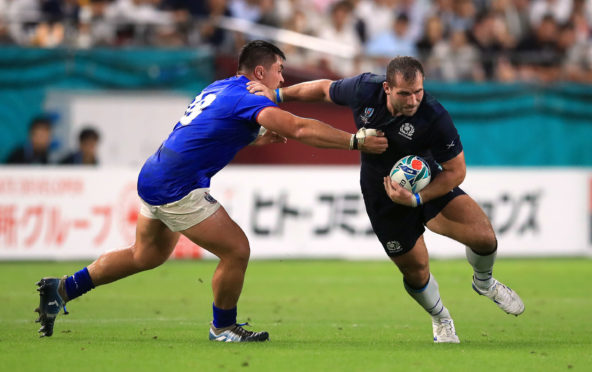Plans to cope with Scotland having to play two games in five days in this World Cup – two of the most important in recent times as well – have been worked on for a year and a half, says Fraser Brown.
The hooker is likely to be involved in both the Russia and Japan games next week, with only a four-day turnaround between the two crucial Rugby World Cup matches.
The Scots’ schedule means they have had nine days twiddling their thumbs before playing the Russians in Shizuoka next Wednesday, and then it’s the big one against the host nation in Yokohama on October 13, with a quarter-final place probably on the line.
But while that seems a daunting task in modern rugby, it’s not as if the Scots haven’t known their fixture list for some time and are ready for it.
“Is it fair? It’s part of the competition, so yes,” said Brown, who may even find himself in the back row at some point against Russia to make sure others stay fresh for Japan.
“We can’t say it’s not fair just because it’s us now, and then say four years ago or last week someone else had the problem so it doesn’t bother you.
“There’s five day turnarounds back home between league games and European games. You just have to deal with it. Rugby is really physically demanding on people’s bodies but we’re all professionals and we’ve got a huge team of guys working behind the scenes to make sure everything’s right with recovery, to nutrition, to how we train.
“They’ve been planning this not just for the last four weeks, they’ve been planning for a year and a half. They have all those things in place. For us we have to go out and get a result against Russia and once that happens it’s about how quick we can recover for the Japan game.”
Much of the test was mental as much as physical, added Brown.
“You can’t hide away from the fact it’s difficult to play two test matches in four to five days,” he said. “There will be guys that will probably play in both games, whether they start both or come off the bench.
“But we’ve known this for a long time, and you’ve got to get your head round it. Get on with it, get your head in it, get ready for Russia and as soon as that game is finished get prepared properly in the time we have for Japan.”
Brown is one of the Scotland squad acutely aware of the welfare issues in the game at present, believes that the squads of 31 simply aren’t big enough for the World Cup with modern demands on the players.
“I don’t think the squad is large enough but it’s what we’ve got to work with at the minute,” he said.
“You just have to look at the progression of rugby over the last couple of years, the physical demands of it.
“It asks a lot. I know World Cups are meant to be challenging, but it’s meant to be a challenge to be able to perform and win. 31-man squads leave you open to disadvantages because you have to take gambles and hope that luck is on your side.
“It does put a lot of strain on guys, particularly now when we’re talking about player welfare and HIAs being a massive focus for the past two or three years. You only have to look at other aspects of the game, predominantly the ruck to see the risk that players are at now.
“31 is probably too few, but it’s the parameters that we’ve got to work with here.”
Brown felt that the performance against Samoa was necessary, as the mood in the camp had been “chastening” after the Ireland defeat.
“Internally we were obviously really disappointed in ourselves and the standards that we set, and no matter how much you try you can’t block out the noise that comes from external sources,” he said.
“You’ve got to deal with that, individually, but as a squad as well. If we set expectations and standards and don’t meet them you’ve got to expect that that’s the sort of scrutiny that’s coming your way, both from the player group, management and the wider public too.
“It probably helps you focus on the fact you can’t take your foot off the pedal ever, or get complacent, because if you do at this level of rugby you can look like a very ordinary team.”


